The demand for skilled SEO freelancers is rising, driven by the increasing importance of online visibility for businesses and the constant evolution of search engine algorithms. If you’re considering becoming an SEO freelancer in 2025, you’re stepping into a field full of opportunities and challenges.
In this guide, we’ll explore the steps you need to take to become a successful SEO freelancer. From honing your skills and building your portfolio to finding clients and setting your rates, we’ll guide you through the essential elements of launching a career and thriving in the cutthroat freelancing business.
Table Of Contents:
What Do SEO Freelancers Do?
SEO freelancers are the unsung heroes behind the scenes, ensuring websites rank high on search engines and attract valuable traffic. They wear many hats and are responsible for a wide range of tasks aimed at optimizing a site’s performance and visibility.
Here’s a closer look at what SEO freelancers do:
1. On-Page SEO
On-page SEO involves optimizing individual web pages to improve rankings and attract relevant traffic. This includes:
- Researching keywords and identifying high-impact terms
- Writing compelling content that aligns with search intent
- Optimizing meta tags, such as titles and descriptions, for better click-through rates
- Structuring content with headers and internal links to improve readability
- Optimizing images with descriptive alt text, proper file names, and compression for faster load times
- Building internal linking to guide users and search engines through the site’s hierarchy
2. Off-Page SEO
Off-page SEO focuses on activities outside the website to boost its authority and credibility. Key tasks include:
- Building high-quality backlinks through outreach and partnerships
- Writing and publishing guest posts to establish authority
- Sharing content on social media platforms
- Collaborating with influencers and thought leaders in relevant niches
- Building relationships through forums and community engagement
3. Technical SEO
Technical SEO ensures a website is easily crawlable and indexable by search engines. SEO specialists focus on:
- Improving website speed and performance
- Fixing crawl errors and resolving broken links
- Implementing structured data for rich search results
- Keeping the site mobile-friendly and secure with HTTPS
- Creating and optimizing XML sitemaps
- Configuring robots.txt files to guide search engine crawlers
- Implementing canonicalization to prevent duplicate content issues
4. Local SEO
For businesses targeting specific geographic areas, local SEO is essential. Tasks include:
- Optimizing Google Business Profiles with accurate and up-to-date information
- Creating localized content and pages to target specific cities or neighborhoods
- Building local citations on directories and review sites
- Managing online reviews to build trust and credibility
- Generating local backlinks to establish connections within the community
5. SEO Strategy
Beyond execution, SEO freelancers often craft tailored strategies to meet clients’ goals. This involves:
- Conducting competitive analysis to identify opportunities and threats
- Monitoring performance metrics like traffic, rankings, and conversions
- Adapting tactics based on algorithm updates and market trends
- Performing comprehensive SEO audits to uncover areas for improvement
- Developing keyword strategies to target high-value search terms
Emerging Trends for SEO Freelancers in 2025
As we move into 2025, SEO continues to evolve with new challenges and opportunities. Freelancers should be aware of:
- AI-Driven Optimization: Tools like ChatGPT are reshaping content creation, making it crucial to focus on originality and human touch.
- Voice Search Optimization: With the rise of smart devices, optimizing for conversational queries is more important than ever.
- E-E-A-T: Demonstrating expertise, experience, authority, and trustworthiness remains vital, especially for industries like finance and health.
- Sustainability Focus: Eco-conscious consumers are driving demand for green business practices, influencing local and global SEO strategies.
Benefits of SEO Freelancing
Why choose freelancing over traditional employment? Here are some compelling reasons:
1. Growing Demand
The demand for SEO freelancers continues to rise post-COVID. According to a January 2025 report, the market for freelancer SEO services is projected to reach $32.13 billion by 2028, with a compound annual growth rate (CAGR) of 17.6%.
2. Flexibility
As a freelancer, you can choose when and where you work. Whether you prefer working from a cozy coffee shop or while traveling the world, freelancing offers unmatched freedom.
3. Competitive Pay
Back in 2022, Search Engine Journal reported that freelancers were making $75,000 to $149,000 a year, compared to just $60,548 for in-house professionals.
As of Jan 16, 2025, the average hourly pay for a freelance SEO in the United States is $47.71 an hour, according to ZipRecruiter. Other sources estimate that an SEO freelancer can make anywhere between $50 to $150 per hour, depending on the complexity of the project.
4. Plenty of Growth Opportunities
Freelancing allows you to diversify your skills, work with different industries, and even scale your business by hiring a team. Each client will have unique needs and challenges, which means you’ll constantly be learning and growing as an SEO professional. This keeps the work interesting and prevents burnout.
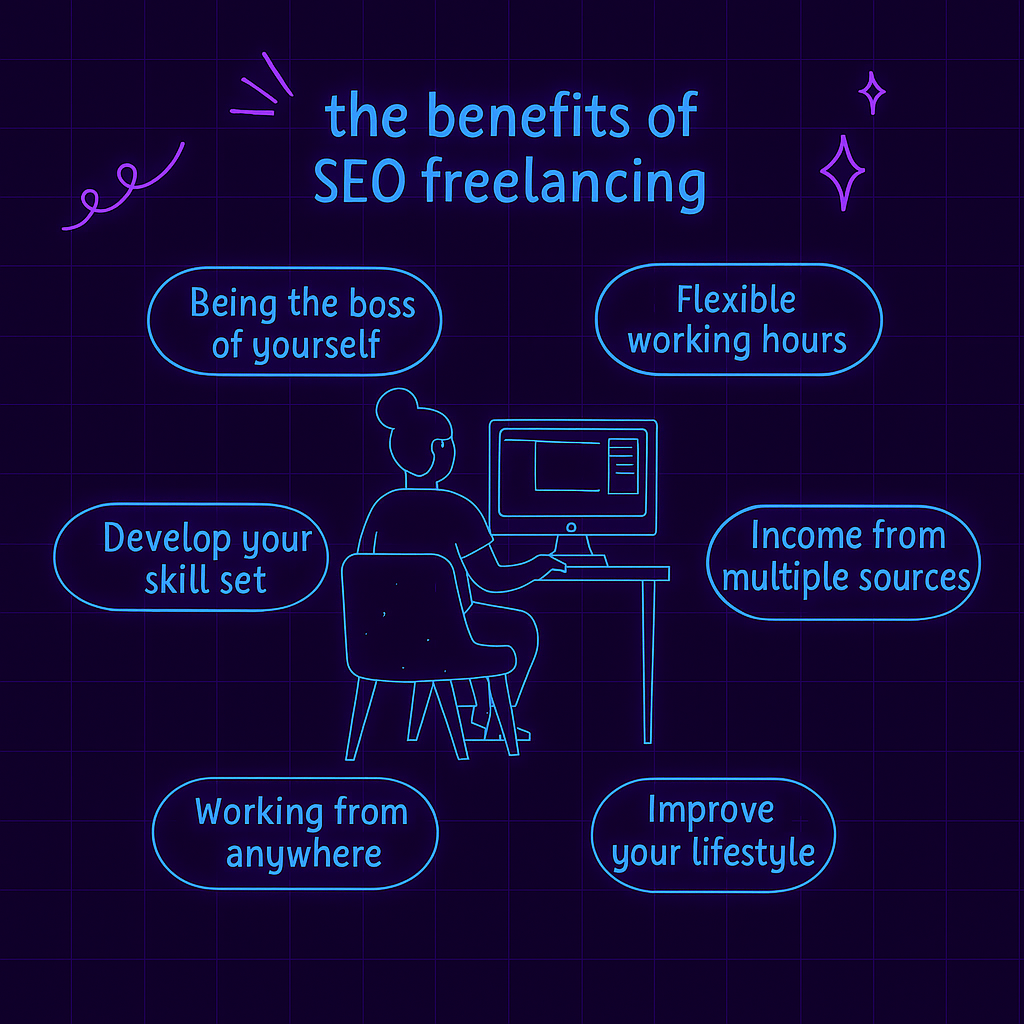
Common Challenges of SEO Freelancing
While freelancing has many perks, it’s not without challenges. Here are a few to consider before you being your SEO freelancing journey:
1. Financial Instability
Inconsistent income can be a concern especially when you’re just starting out. Freelancers often face gaps between projects or delayed payments from clients, making financial planning more complex. Budgeting and maintaining a financial buffer are crucial for navigating these periods.
2. Balancing Multiple Projects
Juggling deadlines, varying client expectations, and overlapping deliverables can become overwhelming without proper time management. The ability to prioritize tasks and create efficient workflows is essential to ensure high-quality output while avoiding burnout.
3. Difficult Clients
You may encounter clients with unrealistic expectations, unclear goals, or poor communication habits. These situations require patience, adaptability, and assertive communication to align expectations and maintain a productive working relationship.

Image source: Freelancermap
How to Build a Successful SEO Freelancing Career
So how do you get started with SEO freelancing? Let me share a step-by-step guide on setting yourself up for a successful career in SEO.
Step 1: Build Your SEO Knowledge Base
To succeed as an SEO freelancer, you must build your knowledge base and stay informed about the latest industry trends, algorithm changes, and best practices.
Learn SEO principles, strategies, and best practices from the following resources:
Industry Blogs: Follow leading blogs like Moz, Search Engine Journal, Content Marketing Institute, and Backlinko for expert insights and updates.
Online Courses: Enroll in courses on platforms like Coursera, Udemy, or HubSpot Academy. Look for certifications in areas like technical SEO, local SEO, and content optimization.
Webinars and Conferences: Participate in events hosted by industry leaders such as Semrush or BrightEdge to gain valuable tips and network with other professionals.
SEO influencers: Follow SEO influencers like Ann Handley, Rand Fishkin, Danny Sullivan, and Lily Ray on social media to learn from their experience.
Forums and Groups: Join communities like Reddit’s r/SEO or Google Search Central to discuss trends and troubleshoot issues with peers. Many SEO-focused groups offer advice, tools, and case studies that can help refine your skills. Look up other SEO professionals in LinkedIn Groups and business owners who might need your services.
Remember, the more knowledgeable you are, the more confidence you’ll have when approaching clients.
Step 2: Develop Your SEO Skills
As an SEO freelancer, your skill set will directly determine your success. Clients are looking for experts who can not only talk the talk but also walk the walk when it comes to driving tangible results.
Whether you’re optimizing content, running technical audits, or building a backlink strategy, mastering these skills will allow you to confidently manage client expectations and deliver exceptional work.
Here’s how you can develop your SEO skills:
1. Master the Basics and Beyond
While SEO evolves constantly, certain fundamentals always apply. This includes:
- Keyword research: Learn how to identify the right keywords for your client’s target audience by analyzing search volume, ranking difficulty, and other metrics. Tools like Google Keyword Planner and Semrush are fantastic for this.
- On-page SEO: Learn how to optimize title tags, meta descriptions, headers, and content for search engines without sacrificing readability or user experience.
- Off-page SEO: Explore strategies for link building, including outreach, guest posts, and partnerships that improve domain authority and search rankings.
- Technical SEO: Understand website structures, mobile optimization, page speed, and how to leverage tools like Google Search Console to fix technical issues.
Once you’ve mastered the basics, dive into more advanced topics like local SEO, international SEO, and AI-driven SEO strategies.
2. Create a Personal Website to Test and Experiment
Hands-on experience is invaluable. To develop your SEO skills, you need a real-world environment to experiment. Building a personal website is a great way to put your knowledge to the test.
Here’s how to get started:
- Build a simple website: Use platforms like WordPress or Wix, and start by optimizing it for SEO. You can experiment with technical SEO elements like site speed, mobile optimization, and structured data.
- Apply different techniques: Test various on-page strategies like keyword optimization, header structure, and internal linking. Track the results using Google Analytics and Google Search Console.
- Run SEO audits: Use tools like Semrush or Ahrefs to run audits on your site and identify areas for improvement. These insights will help you understand common SEO issues and how to fix them. If you already have a good amount of content on your site, run it through a tool like BrandWell to see which ones you need to refresh or rewrite.
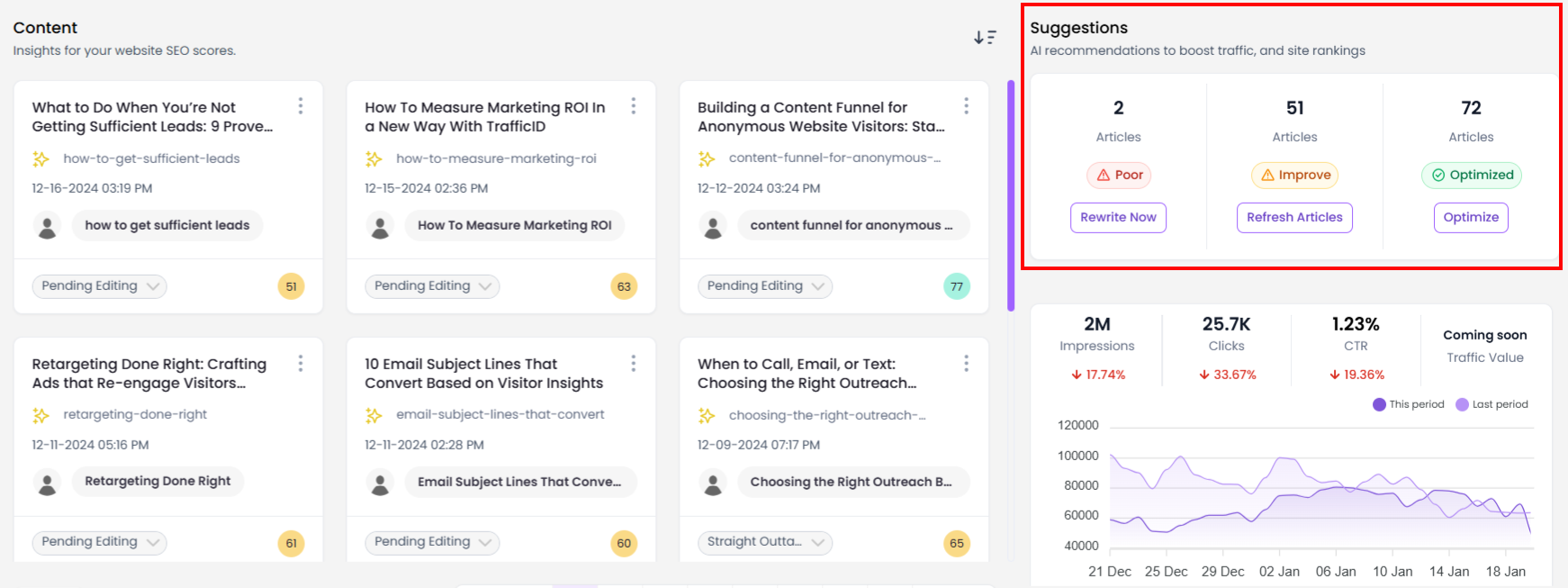
Your website will not only help you develop your SEO skills but will also become a part of your professional portfolio, demonstrating your abilities to potential clients.
3. Volunteer or Freelance for Small Businesses
Consider offering your SEO services for free (or at a discounted rate) to small businesses. This can give you real client experience and allow you to work on different types of websites and industries.
Look for opportunities to help local businesses that may not have the budget for large SEO agencies. You can gain valuable experience optimizing their web pages, running audits, and building strategies tailored to their needs.
Volunteering for small businesses also allows you to develop client communication skills and gain testimonials and case studies that you can later add to your portfolio.
Developing your SEO skills is an ongoing process, but with dedication and practice, you’ll build the expertise needed to succeed as a freelancer.
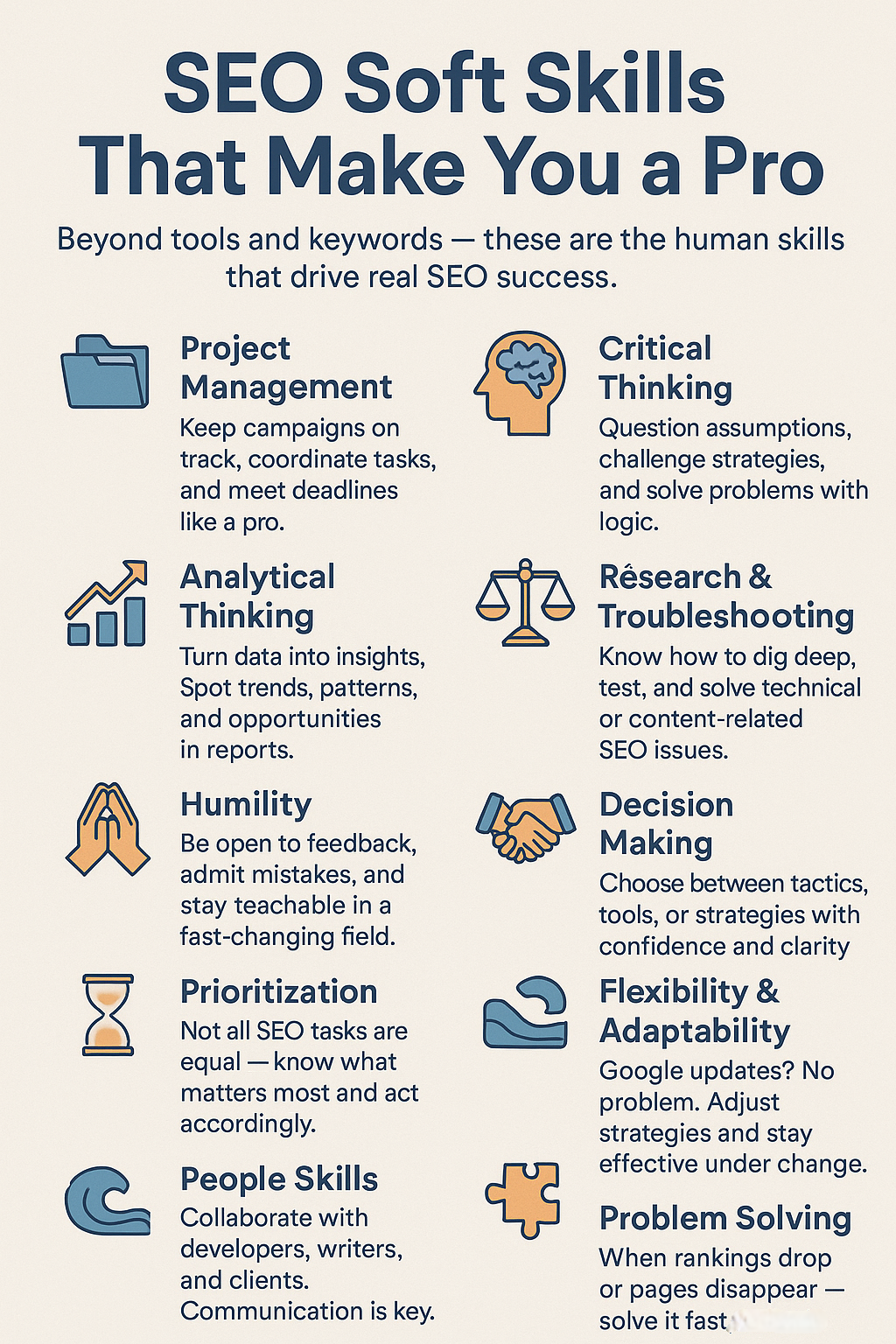
Step 3: Find Your Niche/Target Audience
Now, you can’t be everything to everyone. That’s why it’s crucial to define your target market and tailor your services accordingly.
1. Identify Your Strengths and Interests
First, find what you’re passionate about and what you’re good at. Are you drawn to e-commerce SEO, where you help online stores boost their rankings and sales? Or maybe you have a passion for helping small businesses get found on Google Maps and local search results through local SEO.
Think about your previous work experiences and interests. Are there industries you’ve always found interesting or specific SEO techniques that you excel in?
Are you particularly good at technical SEO, content creation, or local SEO? Your niche should align with what you enjoy and what you’re skilled at.
If you’re drawn to a specific field — whether it’s health, finance, or tech —dive deeper into that niche. It will be easier to stay motivated and keep learning if you’re passionate about your work.
By aligning your niche with your interests and strengths, you’ll create a business that feels fulfilling and sustainable in the long run.
2. Research Profitable Niches
Once you’ve narrowed down your interests, it’s time to explore which niches have the potential to generate steady income. Some industries or types of SEO services are more profitable than others, depending on the demand for those services and the competition in that space.
- Check industry demand: Use keyword research tools to gauge the demand for specific SEO-related searches. For instance, look at how many people are searching for terms like “local SEO services” or “SEO for e-commerce.”
- Assess competition: Find out how many competitors are offering SEO services in the niche you’re considering. A highly competitive niche can be harder to break into, but it can also indicate that businesses in that space are willing to invest in SEO.
- Understand pricing and profitability: Research how much clients in your potential niche are willing to pay for SEO services. Some industries like SaaS or healthcare might have higher budgets for SEO, while SMBs like local coffee shops may have more limited budgets.
Targeting a profitable niche not only helps you secure more clients but also allows you to command higher rates as you become more specialized in that area.
Find more ideas from our guide on The Most Profitable Blogging Niches to Consider in 2025.
3. Evaluate the Profitability of Your Niche
While finding a niche that excites you is important, you also want to make sure it’s profitable. The goal is to ensure there is a demand for your SEO services, and that businesses in your chosen niche are willing to pay for them.
Here’s how to evaluate profitability:
- Understand client budgets: Research the general budget range for SEO services in the niche you’re targeting. Some companies, like law firms or real estate agencies, may have larger marketing budgets, making them more likely to invest in ongoing SEO efforts.
- Look for high-value services: Certain types of SEO, like technical audits or link-building campaigns, may carry a higher price tag. Specializing in these higher-value services can increase your earning potential.
- Identify recurring needs: Some industries may require ongoing SEO work, creating long-term opportunities for clients. For example, e-commerce stores need constant SEO maintenance to stay competitive, which can result in steady, repeat business.
By evaluating the potential profitability of your niche, you’ll ensure that your efforts and skills translate into sustainable income.
4. Test Your Niche with Small Projects
Once you’ve selected a potential niche, it’s time to dip your toes in the water. Take on a few small projects and see if the niche aligns with your strengths and if there’s sufficient demand for your services.
Here’s how to test your niche:
- Run small campaigns: If you’re focusing on local SEO, try helping a local business improve its Google My Business profile or optimize its website for local keywords.
- Evaluate results: After working with a few clients, assess whether you enjoy the work, can generate results, and whether the niche feels sustainable long-term. If you find that you’re struggling to attract clients or the work feels repetitive, it might be time to pivot.
Testing your niche will give you valuable insight into whether it’s the right fit for you — and whether it’s a niche worth continuing to focus on.

Step 4: Define Your Services and Offerings
One of the most important steps in building a successful SEO freelancing career is defining exactly what services you offer.
It’s tempting to say “I can do all things SEO” but the truth is, when you’re starting out, being more specific about your offerings helps you stand out and attract the right clients.
Clear service definitions can also help you establish pricing and manage expectations.
1. Decide What Type of SEO You’ll Focus On
SEO is a broad field, and it’s crucial to narrow down the areas you’re most passionate about or skilled in.
For a beginner, you might want to consider offering:
On-Page SEO: If you’re strong in content strategy and keyword optimization, this might be your sweet spot.
Technical SEO: If you’re a problem solver, technical SEO might be your niche.
Local SEO: If you want to help businesses serve more local customers, then focus on local SEO.
E-commerce SEO: If you’re interested in working with online stores, you can offer e-commerce SEO services to help drive sales.
Content SEO: If you have a writing background, you’ll excel at creating blog posts, landing pages, and articles that are well-optimized for targeted keywords.
SEO Audits: If you’re analytical and love diving deep into a website’s performance, offering SEO audits is a great service where you provide clients with a comprehensive analysis of their site’s SEO health and actionable recommendations.
Once you’ve decided which SEO services you want to specialize in, it’s time to clearly define them in your service offerings.
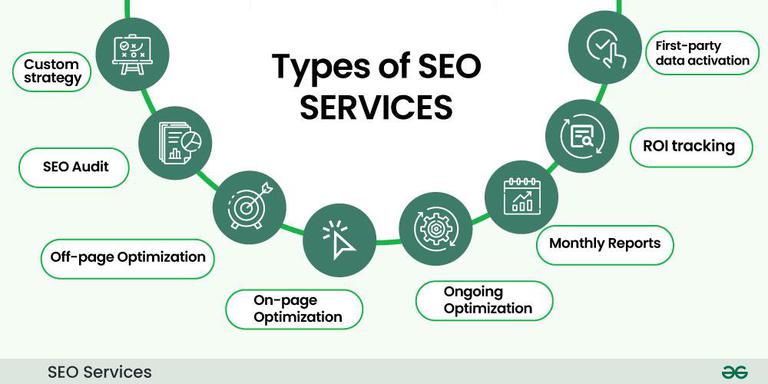
Image source: GeeksforGeeks
2. Bundle Services to Appeal to Different Client Needs
Clients often have different needs based on their business size, SEO goals, and budget. Offering service bundles can help cater to these diverse needs and increase your appeal.
Starter Packages: Perfect for small businesses or startups. You can offer a basic SEO package that includes on-page optimization, keyword research, and a site audit.
Mid-Tier Packages: Aimed at businesses that want more comprehensive SEO work. These packages can include on-page SEO, content strategy, link-building campaigns, and technical SEO services.
Premium Packages: Designed for established businesses that need ongoing SEO support. You can offer a full-service SEO package that includes regular audits, content creation, backlink strategy, and monthly performance reporting.
Bundling your services allows clients to choose the best fit for their needs, and it can be a great way to increase your average project value.
3. Set Clear Deliverables and Timelines
Your clients need to know exactly what to expect when they hire you. Ambiguity can lead to frustration, scope creep, and misunderstandings. Setting clear deliverables and timelines for each service will build trust and set proper expectations.
Be specific: Instead of saying, “I will improve your website’s SEO,” be clear about the actions you will take. For example, “I will optimize your homepage for the keyword ‘best hiking boots’ by updating the title tag, meta description, and incorporating LSI keywords into the content.”
Set timelines: Outline how long each task will take. For example, “Keyword research and on-page optimization will be completed within two weeks of project start.” Clients like to know when to expect results, so being clear about timelines is crucial.
Define success metrics: Make sure your deliverables are tied to measurable outcomes. For instance, “By the end of the first month, I will have increased your website’s organic traffic by 10%” or “We’ll aim for a 15% increase in local search visibility.”
Defining specific deliverables and timelines builds credibility and ensures both you and your clients are on the same page.
4. Offer Additional Services as Upsells
As your SEO expertise grows, you’ll likely come across opportunities to offer additional services that complement your SEO work. These upsells can increase your revenue and provide more value to your clients.
Here are some upsell opportunities you can add to your offerings:
Content Creation: If you’re already doing SEO for a client, you can offer content creation services as an upsell. High-quality, optimized blog posts, landing pages, and product descriptions can significantly boost a site’s performance.
If you are not confident in your writing skills or are simply too busy to create content yourself, you can hire a freelance writer to outsource this task or subscribe to a tool like BrandWell.
BrandWell is an all-in-one keyword research tool, long-form SEO blog writer, and publishing platform that helps freelance SEO specialists and agency owners ramp up their content production without sacrificing quality. Its output is so good you could hardly distinguish if it’s written by a human or a machine.
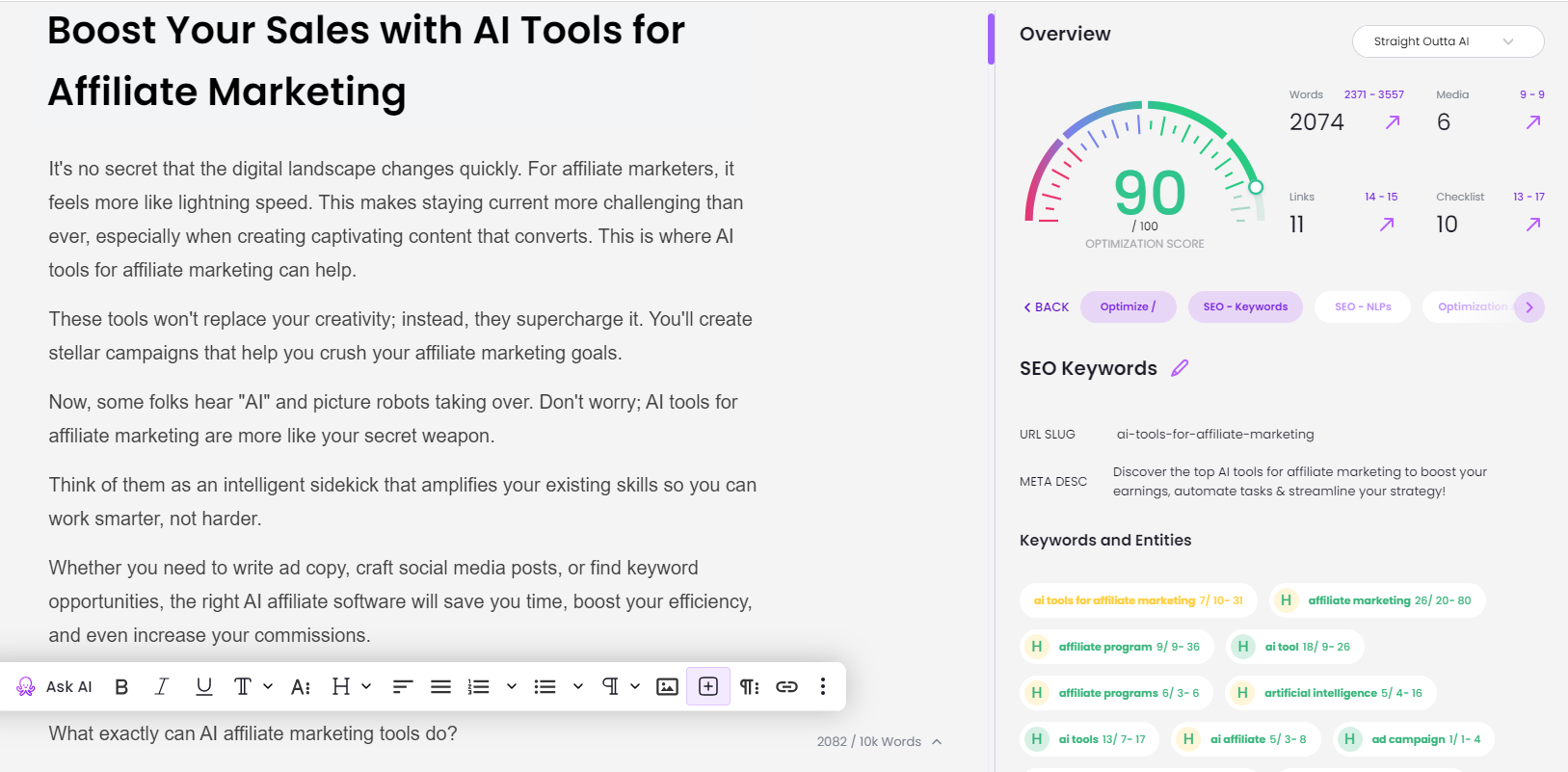
Social Media Marketing: Offering social media management (SMM) alongside SEO can help businesses grow their online presence. Sharing SEO content on social platforms can boost rankings and drive more traffic.
Operating solo? Don’t worry, you can still offer SMM services with the help of BrandWell. Instead of writing hundreds of posts by yourself, let BrandWell’s AIMEE chatbot and AI agents do the heavy lifting.

You can even offer writing services for other marketing tasks:
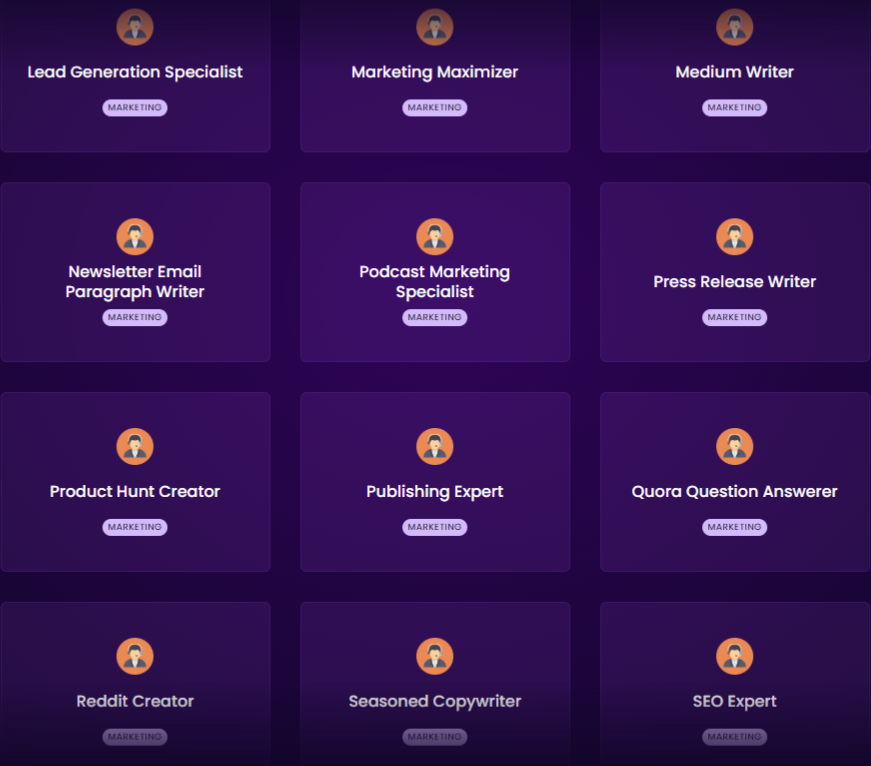
PPC (Pay-Per-Click) Management: Many businesses that invest in SEO also need PPC services to generate leads and sales quickly. By offering PPC campaign management, you can provide a holistic marketing approach.
Web Design and Development: If you have the skills (or can partner with a web developer), offering web design or development services can be a valuable upsell, especially for businesses that need technical SEO and a website redesign.
Upselling allows you to generate more income per client while providing them with additional value.
5. Communicate Your Offerings Clearly
Once you’ve defined your services, make sure potential clients can easily understand what you offer. Your website, portfolio, and client communications should clearly outline your services and how they benefit your target audience.
Create a dedicated service page that outlines all the services you offer, along with a brief description of each, pricing details (if applicable), and examples of your work or case studies.
When sending proposals to clients, be clear about the services you’ll provide, the timeline, and the pricing. Transparency helps build trust and reduces the likelihood of misunderstandings.
During discovery calls, make sure to ask the right questions to understand the client’s needs before discussing your services. Then tailor your offerings based on what the client is looking for.
Clear communication about your offerings helps ensure clients understand the value you bring, making it easier to close deals and build lasting relationships.
Step 5: Develop a Pricing Structure
Your pricing structure is a critical part of defining your services. It’s essential to offer flexibility to cater to different types of clients, whether you’re working with a small business on a budget or a larger company willing to invest more in SEO.
Here’s how to structure your pricing:
Hourly Pricing: Charging by the hour works best for smaller, one-off tasks or consulting calls. This can be ideal for clients who don’t need ongoing SEO but need specific advice or adjustments. Rates typically range from $50 to $200+ per hour, depending on your experience and expertise.
Project-Based Pricing: For clients who need comprehensive SEO work, offering project-based pricing can be more beneficial. For example, you can charge a flat fee of $1,500 for a complete on-page optimization for a website or $3,000 for a full SEO audit and strategy.
Retainer-Based Pricing: Retainers are great for clients who need ongoing SEO support. You can offer a monthly retainer where clients pay a fixed fee each month for services like content updates, technical fixes, and link-building. Retainers can range from $500 to $5,000+ per month, depending on the scope of work.
Package Pricing: As I mentioned earlier, you can bundle different services into packages to cater to various client needs. This allows you to provide value and gives clients a clearer understanding of what they’re getting for their money.
Remember to evaluate the value you’re providing and adjust your pricing as you gain experience and grow your portfolio.
By the time you’re done with Step 5, you’ll have a clear, well-structured SEO business that clients understand and trust. Ready to put your services out there?
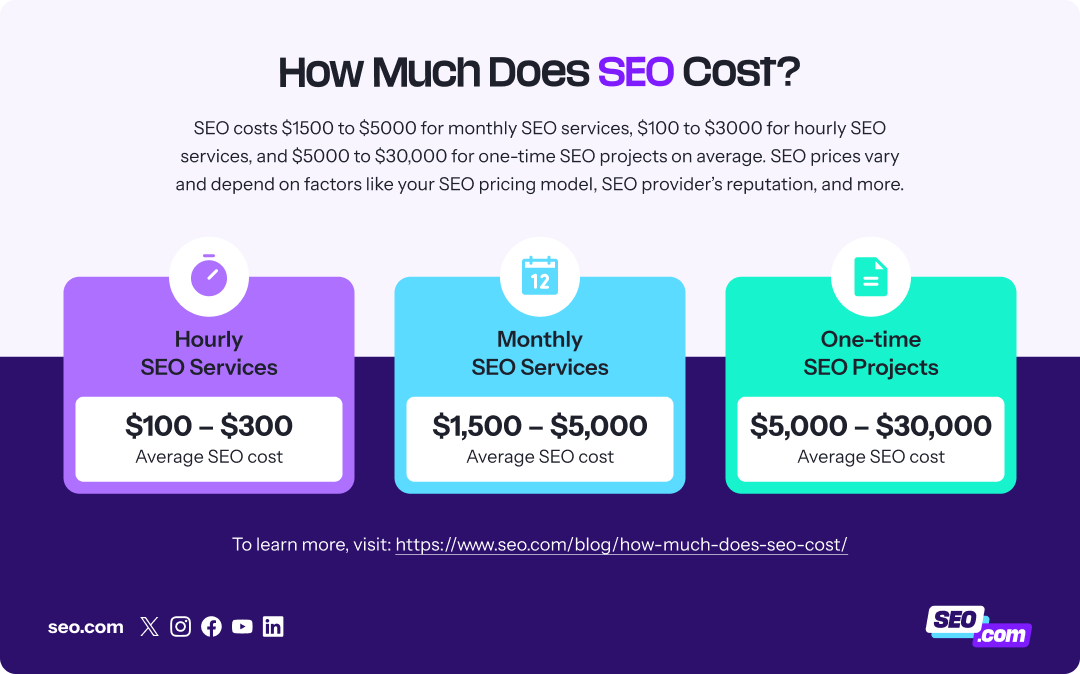
Image source: SEO.com
Step 6: Build an Amazing Portfolio
Your portfolio is your ticket to earning trust and impressing potential clients. It’s your opportunity to showcase your skills, prove your expertise, and demonstrate the results you can deliver.
A strong portfolio doesn’t just display your work — it tells a story about your capabilities and the value you bring to your clients.
Here’s how you can build an impressive portfolio even if you’re just starting out:
1. Highlight Real Results
Clients want to see that you can deliver measurable outcomes. Your portfolio should showcase examples of how your SEO work has helped businesses improve their rankings, traffic, or conversions. Use data to back up your claims.
Here’s how to do it:
- Use before-and-after comparisons: Show how your work improved a client’s keyword rankings, increased their organic traffic, or boosted their conversions.
- Share key metrics: Include metrics like “Organic traffic grew by 60% in 6 months” or “Achieved a top 3 ranking for 5 competitive keywords.”
- Include case studies: For each project, write a short summary outlining the client’s challenges, the SEO strategy you implemented, and the results you achieved.
💡Pro tip: If you’re just starting and don’t have a portfolio yet, use the results from your personal projects as the foundation of your portfolio.
2. Include a Variety of Work
SEO covers a broad range of activities so your portfolio should demonstrate your expertise across different aspects of the field. This variety not only highlights your versatility but also allows potential clients to see that you can meet their specific needs.
What to include:
- Keyword research: Show examples of keyword research reports or strategies you’ve developed.
- Content optimization: Provide screenshots or links to pages you’ve optimized, along with the results they achieved.
- Technical SEO fixes: Highlight projects where you fixed site speed issues, implemented Schema markup, or resolved crawl errors.
- Local SEO: If you’ve optimized a Google My Business profile or helped a local business rank in local search results, showcase those successes.
- Link-building campaigns: Share examples of quality backlinks you’ve built and how they impacted the client’s SEO performance.
By including a range of work, you’ll appeal to a broader audience of potential clients.
3. Showcase Testimonials and Client Feedback
Nothing builds trust faster than hearing from satisfied clients. Include testimonials in your portfolio to provide social proof of your expertise and professionalism.
- Ask for feedback: After completing a project, ask your clients for a short testimonial about their experience working with you.
- Be specific: Encourage clients to mention the results you achieved or what they appreciated most about your work (e.g., clear communication, timely delivery, measurable results).
- Include their logo or photo: If the client agrees, add their logo or photo to the testimonial to make it more authentic.
Even if you don’t have paying clients yet, you can still ask for testimonials from volunteer projects or personal connections you’ve worked with.
4. Create a Professional Presentation
Your portfolio should not only be informative but also visually appealing and easy to navigate. A cluttered or poorly organized portfolio can make it harder for potential clients to understand your value.
Here’s how to create a polished presentation:
- Build a dedicated portfolio page: If you have a website, create a “Portfolio” page where you can showcase your work. Use clear headings, concise descriptions, and visuals to make it engaging.
- Use visuals and screenshots: Include screenshots of Google Analytics reports, search result rankings, or optimized pages to provide visual proof of your work.
- Keep it simple: Avoid overloading your portfolio with too much text or too many examples. Highlight 5–7 of your best projects to keep it focused and impactful.
Tools like Canva or Figma can help you create clean, visually appealing layouts for your portfolio.

5. Include a Personal Project
If you’re a beginner or still building your client base, don’t underestimate the power of personal projects. A personal website or blog can serve as both a testing ground for your SEO skills and a valuable addition to your portfolio.
- Create your own website: Build a website to promote your SEO services. Optimize it for keywords like “freelance SEO services” and track its performance to show clients what you can do.
- Experiment with strategies: Test different SEO techniques such as on-page optimization, link building, and content marketing, and document your results.
- Share your journey: Use your personal project as a case study, detailing how you improved its performance over time.
A personal project demonstrates your initiative and gives you full control over the results you showcase.
6. Make It Easy to Access
Your portfolio won’t do its job if potential clients can’t find it. Ensure it’s easy to share and accessible across various platforms.
- Host it on your website: A dedicated portfolio page on your website is ideal for sharing your work. Include a clear call-to-action like “Contact Me” to encourage inquiries.
- Use PDF versions: If you’re pitching clients via email, have a PDF version of your portfolio ready to attach. Ensure it’s well-designed and easy to navigate.
- Use LinkedIn: Upload key portfolio items to your LinkedIn profile under the “Featured” section. LinkedIn is a powerful platform for networking and attracting clients.
- Share on freelance platforms: If you’re using Upwork, Fiverr, or similar platforms, ensure your portfolio is prominently displayed on your profile.
Your SEO career will grow, and so should your portfolio. Regularly updating your portfolio ensures that it reflects your latest skills, accomplishments, and expertise.
Step 7: Equip Yourself With the Right Tools
SEO tools are your best friends. These platforms help you do everything from keyword analysis to tracking website performance and identifying optimization opportunities.
As a beginner in SEO freelancing, you must be adept and comfortable working with these five basic tools:
BrandWell: If you plan to offer freelance SEO services long-term, then BrandWell should be in your SEO toolkit. This powerful content marketing platform delivers top-tier content, website audits, content intelligence insights, and natural backlinks, all automated by proprietary technology. Accomplish all your SEO tasks in just a few clicks – keyword research, topic reports, competitor analysis, long-form article generation, on-page optimization, WordPress publishing, and writing all types of short-form marketing content just got a whole lot easier.
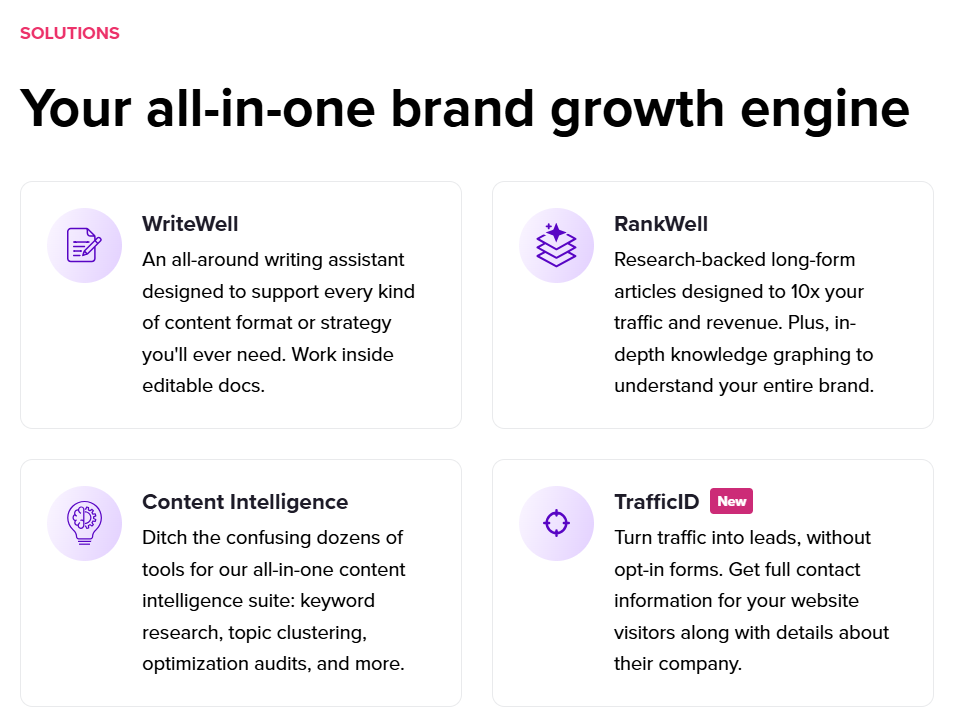
Google Analytics (GA): This is your primary tool for tracking website traffic, user behavior, and conversion data. Learn how to analyze GA data and report it back to your clients.
Google Search Console (GSC): Monitor your site’s presence on Google, track performance, and identify crawl errors or indexing issues.
Ahrefs or Semrush: These industry leaders go beyond keyword research, offering features like keyword difficulty analysis, competitor research, content gap analysis, and backlink analysis. They also provide in-depth insights into your site’s performance.
Canva: Create visually appealing images, reports, infographics, and social media graphics to explain complex data and complement your SEO content.
Familiarize yourself with each tool and practice using them on a test website. If you don’t have a website yet, start with a blog or a personal project. The more you use these tools, the more proficient you’ll become, which will set you apart from other freelancers.
For more advanced users, here are some of the best tools you might want to add to your SEO tech stack:
- Google Keyword Planner (Free): A great starting point for basic keyword research. Use it to find relevant keywords, discover search volume, and estimate competition.
- Ubersuggest (Free + Paid): A beginner-friendly tool for keyword suggestions, content ideas, and domain analysis.
- AnswerThePublic (Free + Paid): A unique tool that visualizes popular search queries, helping you uncover the questions and phrases your audience is asking online. Use it to generate fresh blog ideas and target long-tail keywords.
- Screaming Frog (Free + Paid): A powerful crawler that identifies issues like broken links, duplicate content, and missing meta tags.
- Sitebulb (Paid): A beginner-friendly SEO auditing tool that presents complex data in easy-to-understand visualizations.
- Hotjar (Free + Paid): Provides heatmaps and session recordings, showing how users interact with a website.
- Yoast SEO (Free + Paid): A popular WordPress plugin for on-page SEO optimization, including readability and keyword analysis.
- Hunter.io (Free + Paid): Helps you find email addresses for outreach, making it easier to pitch your content or services.
- TrafficID (Paid): Part of the BrandWell family, this anonymous website visitor identification tool helps you analyze traffic sources, user behavior, and engagement patterns so you can spot content opportunities and track which strategies are driving the most traffic.
- BuzzStream (Paid): A tool for managing link-building campaigns, tracking outreach efforts, and building relationships.
- Trello or Asana (Free + Paid): Project management tools for tracking tasks, deadlines, and project progress.
- Slack (Free + Paid): A communication tool for staying in touch with clients and collaborating in real time.
- ChatGPT (Free + Paid): Use it for generating content ideas, drafting blog outlines, or brainstorming keyword variations.
- Adobe Express (Free + Paid): For more advanced design needs, Adobe Express provides professional-grade tools in a user-friendly format.
The tools you choose will depend on your services, clients, and budget, but investing in even a few high-quality options can significantly enhance your productivity. Start by identifying your current needs, then gradually expand your toolkit as you grow.
Step 8: Market Your Services
You’ve honed your SEO skills, defined your services, and built an impressive portfolio — now it’s time to put yourself out there. Marketing your services effectively is the key to attracting clients, building a steady pipeline of work, and growing your reputation as a top-notch SEO freelancer.
Here’s how to market your SEO services strategically and stand out from the competition:
1. Start Blogging
Blogging is an excellent way to demonstrate your expertise and attract organic traffic to your website. Write content that answers your audience’s most pressing questions and showcases your SEO knowledge.
A few ideas for your blog topics:
“How to Optimize Your Website for Voice Search”
“The Top 5 SEO Mistakes Small Businesses Make”
“A Beginner’s Guide to Keyword Research”
💡Pro Tip: Use tools like AnswerThePublic to identify trending questions in your niche and create blog posts that address them.
2. Get Social
Social media platforms are powerful tools for building your brand and connecting with potential clients. Focus on platforms where your target audience spends their time.
- LinkedIn: Post thought leadership content, success stories, and industry insights. Join SEO and digital marketing groups to network and share your expertise.
- Twitter: Engage in SEO discussions, share updates on algorithm changes, and build relationships with industry peers.
- Instagram: Use visuals to showcase results, promote blog posts, or share behind-the-scenes content of your SEO process.
💡Pro Tip: Post consistently and engage with your followers. Build credibility by answering questions, sharing tips, and interacting with potential clients.
3. Offer Free Resources
Attract potential clients by providing free, valuable resources such as:
- SEO audits: Offer a free mini-audit for prospective clients to showcase your skills and identify opportunities for improvement.
- Downloadable guides: Create an ebook or checklist, like “10 Steps to Improve Your SEO in 2025.”
- Webinars: Host a live session on topics like “Understanding Google Analytics” or “The Basics of Link Building.”
This builds trust and positions you as an expert in your field.
💡Pro Tip: Include a lead capture form on your website to collect contact information in exchange for your free resource.
4. Network in Online Communities
Join forums, Facebook groups, or Reddit communities where your target audience hangs out. Offer genuine advice and value to establish yourself as an expert.
- SEO forums: Participate in SEO-focused communities like Moz Q&A or SEO Chat.
- Business owner groups: Join groups where small business owners discuss challenges, and subtly pitch your services when relevant.
- Freelancer platforms: Use Upwork, Fiverr, or Freelancer to connect with clients actively seeking SEO services.
💡Pro Tip: Be helpful and avoid hard selling. Clients will naturally gravitate toward freelancers who demonstrate expertise and a willingness to help.
5. Run Paid Ads
If you want to amplify your reach quickly, consider running paid ads. Platforms like Google Ads and social media ads allow you to target specific audiences who might need SEO services.
- Google Ads: Target keywords like “SEO freelancer near me” or “local SEO services.”
- Facebook Ads: Use custom audiences to target small business owners or digital marketers.
- LinkedIn Ads: Focus on decision-makers like marketing managers or business owners.
💡Pro Tip: Start with a small budget and refine your campaigns based on performance data.
6. Build Partnerships
Collaborating with complementary professionals or agencies can open up new opportunities for client referrals.
- Web developers: Offer to optimize the sites they build for SEO.
- Graphic designers: Team up to deliver comprehensive branding and SEO services.
- Digital marketing agencies: Many agencies look for freelance SEO experts to handle specialized tasks.
💡Pro Tip: Don’t be afraid to ask for referrals from satisfied clients. Word-of-mouth marketing can be incredibly powerful for growing your freelance business. Partners earn a commission for every client they send your way.
7. Go Old-School Email Marketing
Email marketing allows you to stay top of mind with prospects and nurture them into clients.
What to send:
- Newsletters: Share SEO tips, success stories, or updates on industry trends.
- Promotional offers: Offer discounts on your services for a limited time.
- Case studies: Highlight how you’ve helped other clients achieve success.
Marketing your SEO services is all about showcasing your expertise, building trust, and reaching the right audience. Whether through your website, social media, or networking, a well-rounded marketing strategy will position you as a go-to expert in the field.
Remember: consistency is key. The more visible and credible you are, the more clients you’ll attract.
Step 9: Build a Strong Personal Brand
What do Neil Patel, Gary Vaynerchuk (GaryVee), and Seth Godin have in common? They’ve all built a strong personal brand in the world of digital marketing.
Your brand is your unique selling point. It’s what makes you stand out in a sea of SEO professionals.
How can you build a memorable and impactful personal brand that attracts clients?
1. Define Your Unique Value Proposition (UVP)
Your unique value proposition (UVP) is a clear statement that highlights your specific expertise, niche focus, and the tangible benefits you deliver to clients.
It’s the answer to the question, “Why should clients choose me over someone else?”
Some examples of UVPs for an SEO freelancer:
“Data-driven SEO specialist focused on driving organic traffic for e-commerce businesses through advanced keyword research and technical optimization.”
“Local SEO expert providing targeted strategies to boost visibility for small businesses in [specific geographic area] using proven local ranking factors.”
“Content-centric SEO freelancer specializing in creating high-quality, engaging content that attracts and converts relevant audiences, maximizing your website’s organic reach.”
2. Create a Strong Online Presence
Your online presence is often the first impression clients have of you. Make sure it’s professional, consistent, and aligned with your brand values.
Focus on these important elements:
- Professional photo: Use a high-quality, approachable headshot across platforms.
- Consistent branding: Use the same colors, fonts, and tone of voice on your website, social media, and marketing materials.
- Unified bio: Write a compelling bio that highlights your expertise, services, and achievements.
💡Pro Tip: Use Canva to create branded templates for social media posts and email signatures.
3. Showcase Your Expertise
Position yourself as a thought leader by sharing valuable insights and engaging with your audience.
To showcase your expertise, you can:
- Write blogs: Share actionable SEO tips and industry updates on your website or LinkedIn.
- Post on social media: Share quick tips, case studies, and client success stories.
- Create videos: Post short explainer videos on YouTube or Instagram about topics like keyword research or link building.
4. Leverage Testimonials and Social Proof
Nothing builds trust faster than glowing testimonials and tangible proof of your success.
Build social proof by:
- Asking past clients for feedback and permission to share their comments publicly
- Showcasing results with data, such as “Increased organic traffic by 150% in 3 months”
- Displaying logos of companies you’ve worked with (with permission) to build credibility
💡Pro Tip: Feature testimonials prominently on your website and social media profiles.
5. Engage Consistently with Your Audience
Building a strong personal brand isn’t just about broadcasting — it’s also about listening and engaging.
To connect with your audience:
- Respond to comments and messages on social media.
- Participate in discussions on LinkedIn, SEO forums, and Reddit communities.
- Send personalized thank-you messages to clients and followers who interact with your content.
💡Pro Tip: Use scheduling tools like Buffer or Hootsuite to maintain a consistent posting schedule while staying active in real-time conversations.
6. Show Off Your Personality
People don’t just hire businesses — they hire individuals they connect with. Infuse your personal brand with elements of your personality to make it relatable.
Show off your personality by:
- Sharing your journey: Talk about how you got started in SEO and why you’re passionate about it.
- Posting behind-the-scenes content: Show glimpses of your work process, client wins, or even hobbies.
- Using your voice: Write posts and blogs in a tone that feels authentic to you.
Building a strong personal brand takes time, but the rewards are worth it. Be authentic, consistent, and engaging, and over time, your brand will become a magnet for opportunities.
Find more tips on how to build a strong brand in this comprehensive guide.
Step 10: Network With Other Freelancers
While freelancing is often seen as a solo endeavor, building connections with fellow freelancers can be a game-changer for your career.
Networking with other SEO professionals, content creators, web developers, and marketers opens the door to collaboration, knowledge sharing, and client referrals.
Follow these tips to start building relationships that benefit your SEO freelancing career:
1. Join Online Communities
The internet is a treasure trove of freelancer communities where you can meet like-minded professionals, exchange ideas, and even find work opportunities.
Where to start:
- SEO-specific groups: Join Facebook groups like “SEO Signals Lab” or “The SEO Vault.”
- LinkedIn groups: Look for groups like “Digital Marketing Professionals” or “Freelance SEO Experts.”
- Slack communities: Search for invite-only SEO or marketing channels like “Online Geniuses.”
- Reddit forums: Participate in subreddits like r/SEO or r/Freelance.
2. Attend Industry Events
Conferences, meetups, and workshops are fantastic opportunities to connect with professionals in the SEO and digital marketing world.
Some events you might want to add to your 2025 calendar:
- Brighton SEO
- Search Marketing Expo (SMX Munich)
- Women in Tech SEO Festival
- Social Media Marketing World
- B2B Marketing Expo 2025
- MozCon 2025
- SEOktoberfest G50 Summit
- Content Marketing World 2025
- Pubcon 2025
💡Pro Tip: Prepare an elevator pitch about your services and bring business cards or a digital QR code linking to your portfolio.
3. Participate in Webinars and Podcasts
Sharing your expertise in public forums not only builds your personal brand but also introduces you to other professionals in the industry.
How to get involved:
- Attend webinars hosted by thought leaders and ask insightful questions during Q&A sessions.
- Pitch yourself as a guest on podcasts or co-host a session with another freelancer.
- Host your own webinar or podcast and invite other freelancers to join as guests.
💡Pro Tip: After an event, follow up with participants on LinkedIn to continue the conversation and explore collaboration opportunities.
4. Be Generous with Advice and Support
The freelance world thrives on community. Being approachable and helpful to others in your field can strengthen your network and lead to unexpected opportunities.
Ways to help:
- Share resources like tools, templates, or strategies that have worked for you.
- Mentor new freelancers who are just starting out.
- Offer constructive feedback on projects or portfolios when asked.
Networking with other freelancers is a powerful way to grow your career, gain insights, and unlock new opportunities. By actively engaging in communities, attending events, and collaborating on projects, you’ll build a network of trusted peers who can support you throughout your freelancing journey.
Remember: freelancing doesn’t have to be lonely. When you invest in meaningful connections, you’re not just growing your network — you’re building a community.
How to Find Clients as an SEO Freelancer
Once you’ve laid the groundwork for a successful SEO freelancing career — developing your skills, defining your services, and building your brand — the next step is to find clients who need your expertise.
Client acquisition is a crucial part of freelancing, and with the right strategies, you can create a steady stream of opportunities to grow your business.
Here are four ways to find your first clients as an SEO freelancer:
1. Leverage Your Network
Start with the connections you already have — friends, family, former colleagues, and acquaintances. Your network can be a powerful source of referrals and leads.
Let people know you’re offering SEO services through social media posts, emails, or casual conversations.
Reach out to businesses you’ve worked with in the past and offer your services.
Attend local networking events or join community groups to meet small business owners who may need SEO help.
💡Pro Tip: Be specific about the services you offer and how they can help.
2. Use Freelance Platforms
Freelance marketplaces are excellent for finding initial projects. They connect you directly with businesses actively searching for SEO professionals.
Here are the top platforms for SEO freelancers:
- Upwork: Create a detailed profile highlighting your expertise and apply to relevant job postings.
- Fiverr: Offer specialized SEO gigs, like keyword research or technical audits, to attract clients.
- Toptal: Position yourself as a top-tier SEO expert by applying to this exclusive platform.
💡Pro Tip: Tailor your proposals to each client, showcasing your understanding of their needs and explaining how you can solve their problems.
3. Do Cold Outreach
Cold outreach can be highly effective if done thoughtfully. The key is to personalize your approach and demonstrate how your services can add value.
How to reach out to strangers without sounding annoying:
- Research potential clients: Focus on businesses with poorly optimized websites or those who could benefit from increased online visibility.
- Personalize your message: Mention specifics about their business and how you can help.
- Offer a free value-add: For example, include a brief website audit or suggest a few quick improvements.
💡Pro Tip: Use tools like Hunter.io to find email addresses and Mailshake to streamline your outreach efforts.
Finding clients as an SEO freelancer requires a proactive and multi-faceted approach. Whether you’re leveraging your network, using freelance platforms, or building a strong online presence, consistency and persistence are key. By combining these strategies, you can attract the right clients, grow your reputation, and build a thriving freelancing career.
Managing Your Freelance SEO Business
Running your own freelance SEO business isn’t all about keyword research and on-page optimization. Trust me, I’ve been there. Managing clients, projects, and your own time effectively is crucial to your success and sanity as a freelancer.
Let’s dive into some key aspects of managing your SEO freelance business.
Client Communication and Relationship Management
Clear, consistent communication is the foundation of any strong client relationship. Make sure you’re always available to your clients through their preferred channels, whether that’s email, phone, or carrier pigeon (okay, maybe not that last one).
Set expectations early on about your communication style and frequency. I like to schedule regular check-in calls with my clients to discuss project progress, address any concerns, and ensure we’re always on the same page.
Remember, your clients are trusting you with their online visibility. Show them that you’re invested in their success by being responsive, transparent, and proactive in your communication.
Project Management and Time Tracking
Juggling multiple clients and projects can quickly become overwhelming without a solid project management system in place. I rely on tools like Trello and Asana to keep my tasks organized, deadlines on track, and clients updated.
Time tracking is another essential aspect of project management for SEO freelancers. Accurate time tracking ensures you’re billing clients fairly and helps you identify areas where you can improve your efficiency. Tools like Toggl or Harvest make it easy to track your time across different projects and clients.
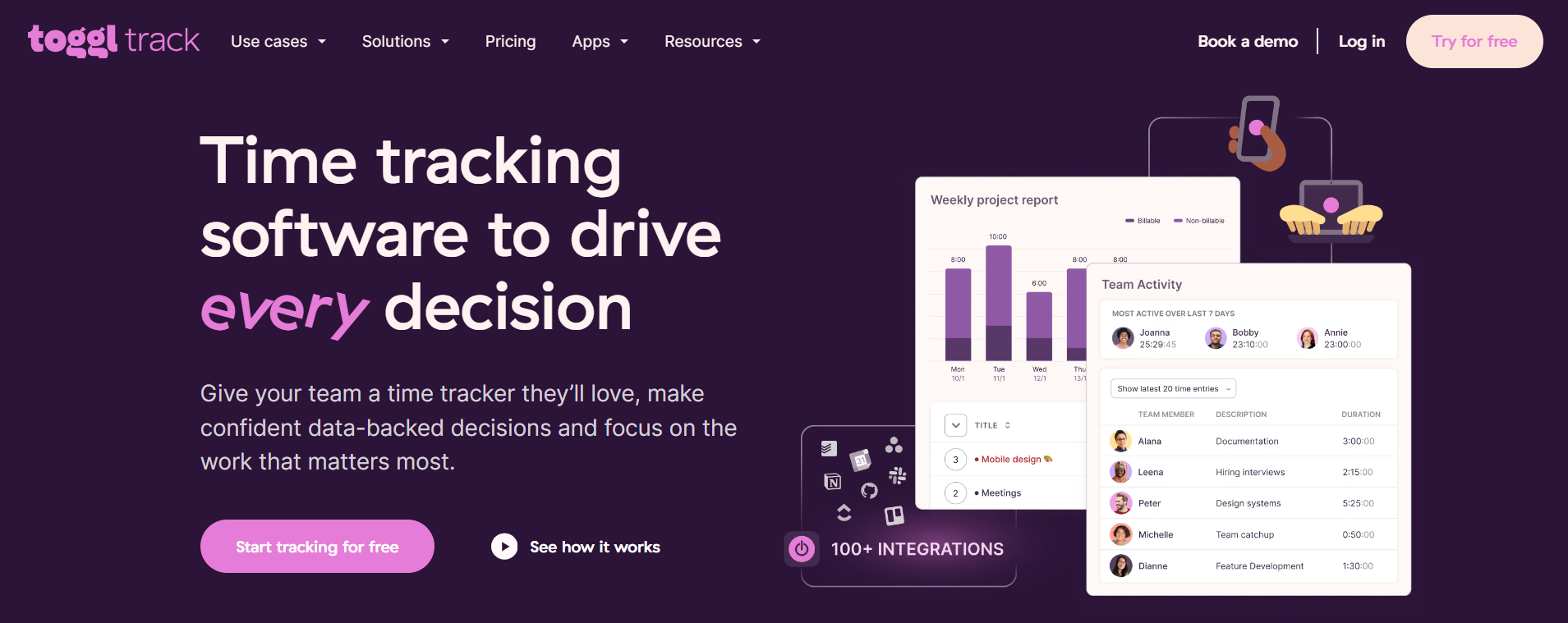
As an SEO expert, I know that time tracking isn’t the most glamorous part of the job. But trust me, implementing these systems early on will make your freelance life infinitely easier in the long run.
Invoicing and Payment Processing
Getting paid is pretty important, right? Establishing a clear invoicing and payment process is crucial for maintaining a steady cash flow and avoiding any awkward client conversations down the line.
I recommend using invoicing software like FreshBooks or QuickBooks to create professional, detailed invoices for your clients. Be sure to outline your payment terms, including your hourly rate or project fees, due dates, and accepted payment methods.

Consider offering incentives for early payment or setting up recurring monthly retainers for ongoing SEO work. This can help you predict your income more accurately and build long-term relationships with your clients.
Scaling Your Business
As your reputation grows and your client list expands, you may find yourself reaching capacity as a one-person show. This is where scaling your business comes into play.
One option is to outsource certain tasks to other freelancers or agencies. This can free up your time to focus on higher-level strategy and client management. Just be sure to vet your partners carefully and maintain open lines of communication to ensure quality work.
Another approach is to productize your services, creating standardized packages or offerings that you can sell at scale. This can streamline your sales process and make it easier to onboard new clients.
Whichever path you choose, remember that scaling your business requires careful planning and execution. Don’t be afraid to seek out mentorship or guidance from other successful SEO freelancers who have been in your shoes.
FAQs: How to Become an SEO Freelancer
How much do SEO freelancers make?
SEO freelancers’ earnings vary widely, ranging from $54k to $93k annually, depending on their skill set, experience, and client base.
Can I do SEO as a freelancer?
Absolutely. With the right skills in search engine optimization, technical web management, and content creation, you can start offering your services to potential clients globally.
How do I become a freelance SEO consultant?
Start by mastering SEO fundamentals through courses and practical experience. Then build an online presence to showcase your expertise and attract clients.
How to start a career in SEO?
Dive into learning with online courses focused on technical SEO strategies and tools. Gain real-world experience through internships or volunteering before hunting for paid gigs.
Conclusion
After reading through this guide, you now have a roadmap on how to become an SEO freelancer. This isn’t merely work — it’s a passion-driven career where you’re helping businesses grow while enjoying the freedom freelancing offers.
Becoming an SEO freelancer in 2025 is a rewarding career path with immense potential. While challenges like financial instability and client management exist, the benefits of flexibility, high pay, and growth opportunities make it worth the effort.
Start today and position yourself as an in-demand SEO expert!




